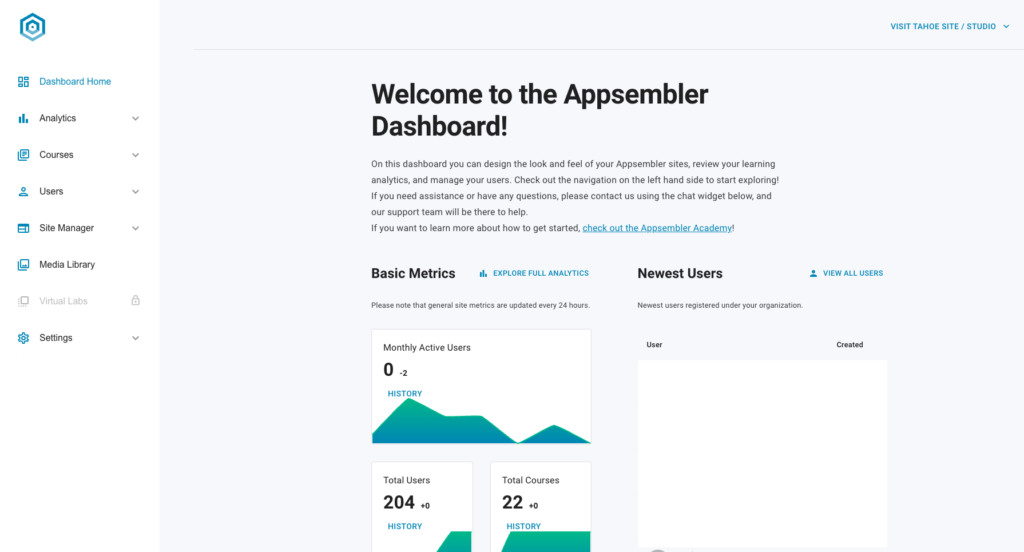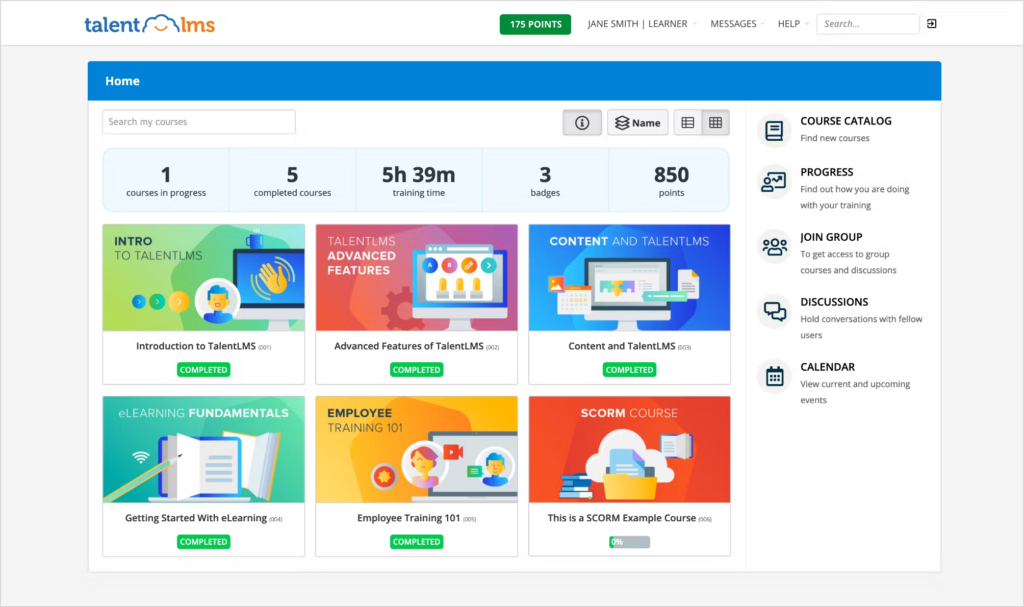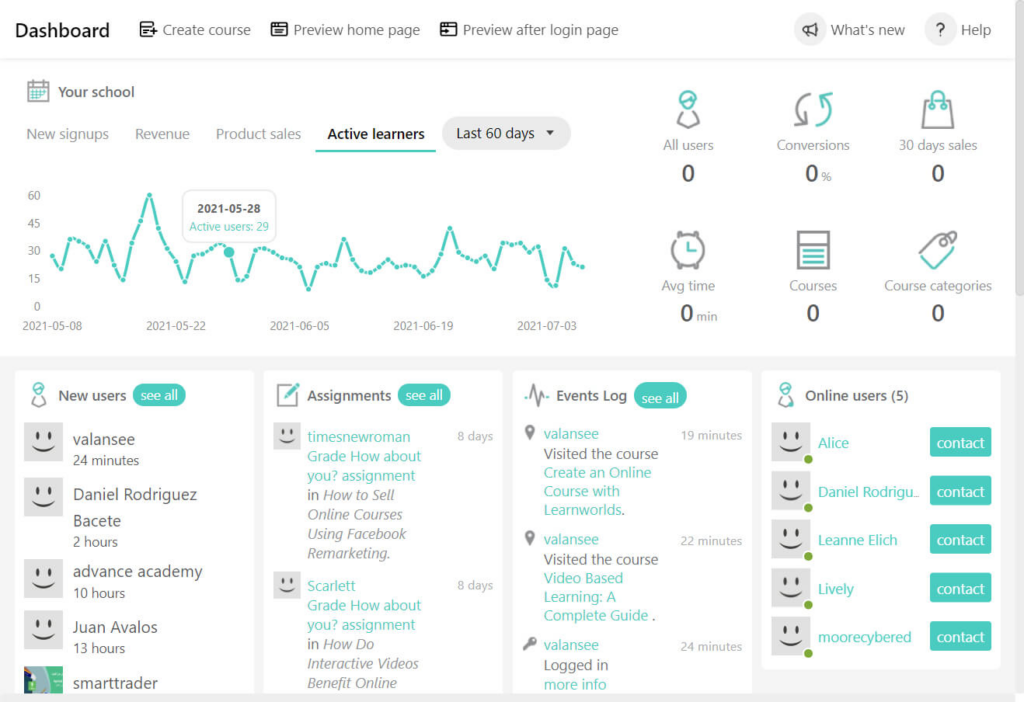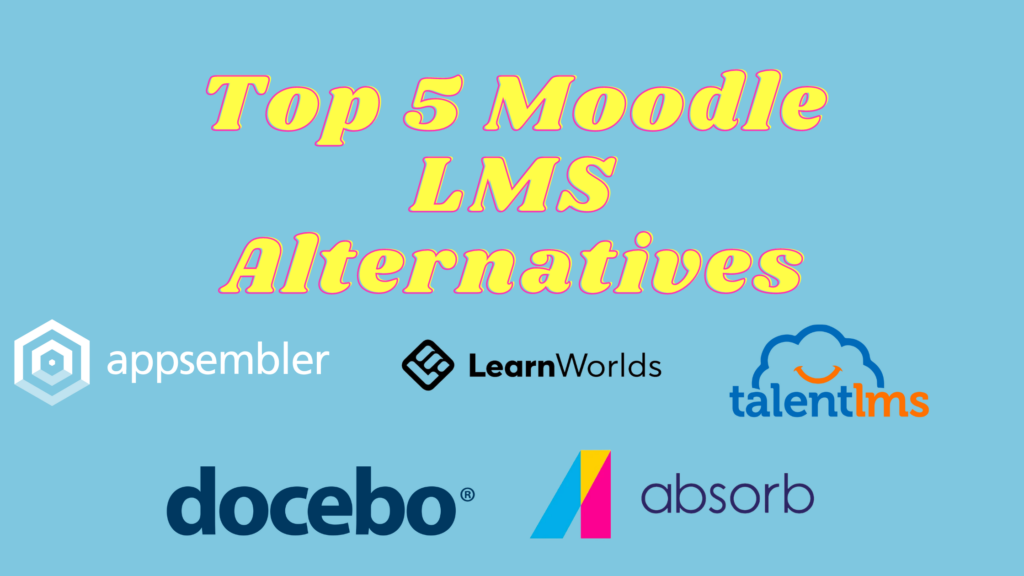In e-learning, educators and institutions frequently explore alternatives to popular LMS platforms, the Moodle learning management system being no exception. Whether you’re seeking alternatives with a more robust feature set or are simply curious, come explore the five top Moodle alternatives in 2024.
Key Takeaways:
- Assess Flexibility: Evaluate if the LMS can be customized to fit unique educational needs and processes.
- Consider Scalability: Ensure the LMS can grow with your institution, seamlessly accommodating more users and courses.
- Examine Integration Capabilities: Check for the ability to integrate seamlessly with existing systems and tools.
- Review Pricing Structures: Understand the pricing models to align with your budget and avoid hidden costs.
- Prioritize User Experience: Choose an LMS offering an intuitive, user-friendly interface for educators and learners.
LMS Platform |
G2 |
Customization |
Scalability |
Integration |
Pricing |
Appsembler Tahoe |
4.9/5 |
5/5 |
5/5 |
4/5 |
$520-$2625 per month |
Talent LMS |
4.6/5 |
4/5 |
4/5 |
4/5 |
$69-$459 per month for standard plans. Inquire about enterprise plans. |
Docebo |
4.3/5 |
3/5 |
4/5 |
4/5 |
|
Absorb |
4.7/5 |
4/5 |
4/5 |
4/5 |
|
LearnWorlds |
4.7/5 |
4/5 |
3/5 |
4/5 |
$24-279 per month, with custom quotes available for high volume |
Table of contents
What is Moodle?

Rating: 4.1/5 (G2)
Moodle, an acronym for Modular Object-Oriented Dynamic Learning Environment, is a comprehensive open-source LMS renowned for its scalability and flexibility. Designed to support both small and large-scale learning, Moodle’s robust framework allows for significant customization, especially in data management and analytics.
This level of personalization enables administrators to tailor the learning environment, track progress effectively, and make data-driven decisions, thereby enhancing the overall experience. The platform’s flexibility in accommodating various teaching and learning styles and its ability to integrate with many plugins and external tools make it a preferred choice for institutions globally.
Moodle: Key Features
Moodle’s diverse features are tailored to enhance learning experiences by focusing on flexibility, integration, and effective communication. The pivotal features that work together to create a dynamic and efficient learning environment include:
- Custom Competency Frameworks: This feature allows educators to develop and apply specific competency frameworks within their courses, enabling targeted skill development and assessment. It aids in aligning educational content with desired learning outcomes, ensuring students acquire the skills and knowledge that meet academic or industry standards.
- Certified Integrations: Moodle’s certified integrations offer seamless connectivity with various third-party tools and services. This interoperability enhances the LMS’s functionality, allowing for a more enriched and comprehensive educational experience that can include everything from plagiarism detection to content authoring tools.
- Automated Emails and Notifications: This functionality streamlines communication by automatically sending updates, reminders, and notifications to students and educators. These automations allow course administrators to focus more on course development and analysis. Pros & Cons of Using Moodle
Pros:
- Customer Support: Moodle offers robust customer support, ensuring users can access assistance when needed. This reliable support system enhances the overall user experience by promptly addressing issues or queries.
- Assessment Tools: Moodle provides various assessment tools, including quizzes, assignments, and grading features. This variety allows educators to create diverse and effective assessment methods, benefiting instructors and learners.
- Customization Options: Being an open-source platform, Moodle offers extensive customization options. Users can tailor the LMS to their specific needs, providing flexibility and adaptability for various educational contexts. This level of customization enhances user satisfaction and meets unique requirements.
Cons:
- Ease of Customization: While Moodle offers customization options, some users find them clunky and challenging. The complexity of the customization process can be a drawback for those with limited technical expertise, potentially hindering their ability to create a tailored learning environment.
- Learning Curve: Users often report a steep learning curve for LMS managers and administrators. Navigating Moodle’s features and settings can be time-consuming and require a significant investment in training, which can be a challenge for institutions or organizations looking for quick implementation.
- The Need for Add-Ons: To access certain advanced customizations and features, users may need to pay for add-ons or premium services. This additional cost can be a disadvantage for budget-conscious institutions or organizations as it may increase the overall expenses associated with using Moodle.
Considerations for Moodle LMS Alternatives
Several critical factors come into play when considering alternatives to Moodle as an LMS: customization, scalability, integration, and pricing. Each of these aspects can significantly impact an LMS alternative’s overall usability, adaptability, and cost-effectiveness.
Customization
A highly customizable LMS allows institutions to tailor the platform to their needs, aligning it with their unique pedagogical approaches and branding. Customization empowers educators to create dynamic content, adapt to changing needs, and enhance user satisfaction. This translates to a more engaging and personalized learning journey for learners, while administrators benefit from greater control over course design and delivery.
Scalability
Scalability ensures the LMS can quickly adapt to accommodate increased content, users, and evolving workflows as your institution or organization grows. This flexibility allows for seamless expansion without disruptions to learning processes. A scalable LMS also provides the agility to adjust learner paths and integrate new features, enhancing the educational experience while efficiently managing growth-related challenges.
Integration
A well-integrated LMS is a central hub for all educational resources, tools, and data. Seamless integration with other software applications and systems, such as student information systems or content repositories, simplifies the user experience and streamlines administrative tasks.
Limited integrations can hinder LMS efficacy as your institution seeks to expand and incorporate various elements into its existing technology stack. Choosing an LMS with robust integration capabilities is essential to ensure a cohesive and efficient learning ecosystem.
Pricing
While not the sole determinant, pricing is a crucial consideration in selecting an LMS alternative. Transparent pricing models enable institutions to make informed and strategic decisions about their LMS investment. As institutions grow, pricing scalability becomes vital, ensuring the cost aligns with the increasing number of users and features needed. A clear understanding of pricing structures allows for budgeting and long-term planning, facilitating a sustainable and cost-effective LMS solution.
5 Moodle LMS Alternatives
Moodle has been a steadfast LMS option for many. As user needs evolve and technology advances, however, exploring alternatives becomes imperative. Let’s delve into the top five Moodle alternatives.
1. Appsembler Tahoe

Rating: 4.9/5 (G2)
Appsembler Tahoe stands out as a compelling alternative to Moodle LMS. It offers a range of features and capabilities that make it an attractive choice for online training and learning management. That includes:
- 99% Uptime Rate: Appsembler Tahoe guarantees a high uptime rate, ensuring reliable and consistent access to learning materials and courses. This reliability is crucial for maintaining uninterrupted educational experiences.
- Custom Dashboards: The platform offers highly customizable dashboards. They allow users to tailor their interface and focus on relevant information and tools while enhancing usability and learner engagement.
- OpenAPI Access: Appsembler Tahoe provides OpenAPI access, enabling extensive integration capabilities with other systems and tools. This feature broadens the platform’s functionality and enhances learning experiences by allowing seamless connectivity with various external applications.
Appsembler Tahoe’s design focuses on customization and scalability. Its user-friendly interface and advanced customization capabilities make it suitable for diverse learning and training requirements. The platform can easily accommodate increasing numbers of users and courses.
Appsembler Tahoe is ideal for many use cases, including immersive learning experiences, self-paced courses, and hands-on software experiences. Features like custom domains, single sign-on, and dedicated course author training contribute significantly to its appeal.
Integrations are a key strength of Appsembler Tahoe, with pre-built integrations with third-party systems like video conferencing tools (BigBlueButton, Zoom), auto-grading systems (Illumidesk), and SCORM hosting providers (SCORMCloud). This extensive integration capacity allows for a versatile and cohesive learning environment.
In terms of pricing, Appsembler Tahoe adopts a flexible approach, with its pricing based on the features you’re looking for as well as the number of monthly active users (MAUs). The platform offers a transparent and inclusive pricing strategy, with no separate setup, onboarding, or training fees
2. Talent LMS

Rating: 4.6/5 (G2)
Talent LMS is an online training platform offering a range of features to enhance the learning experience. Let us look at its features and functionalities.
- In-Platform Reporting: Talent LMS provides detailed reporting capabilities, allowing educators and administrators to track learner progress and evaluate course effectiveness. This feature is crucial for understanding the impact of training and making informed decisions about future learning initiatives.
- Custom Sub Accounts: The platform enables the creation of custom sub-accounts, making it ideal for organizations that need to deliver tailored learning experiences to different groups or departments. This feature enhances the platform’s flexibility and helps cater to the specific training needs of various segments within an organization.
- Automated Administrative Tasks: By automating routine administrative tasks, Talent LMS reduces manual workload and increases efficiency. This feature allows administrators to focus more on the strategic aspects of training rather than getting bogged down by day-to-day management.
Talent LMS is designed for both customization and scalability. It supports various industries, including healthcare, software, consulting, and retail, among others. The platform’s structure makes it easy for organizations to onboard and upgrade, ensuring it can grow with an institution’s evolving needs.
Talent LMS integrates with many third-party applications, enhancing its versatility and functionality. These integrations include popular tools like video conferencing apps and HRIS systems that further extend its capabilities.
The platform’s pricing structure is designed to cater to organizations of various sizes. It offers a range of plans, providing flexibility and scalability in terms of cost. This approach ensures that organizations can choose a plan that aligns with their training needs and budget constraints.
3. Docebo

Rating: 4.3/5 (G2)
Docebo’s LMS is recognized for its comprehensive features that cater to various learning experiences:
- Gamification: Docebo enhances learner engagement through gamification features. Administrators can create a competitive and rewarding system within the LMS by assigning badges and awards to learners. This approach motivates learners and fosters a sense of achievement and competition.
- Coaching App: The platform is pivotal to supporting learners, especially in scenarios where instructor-led guidance is minimal or nonexistent. This feature is particularly effective in improving course completion rates for non-instructor-led courses, making it a valuable tool for personalized learning experiences.
- Custom Domain: Docebo allows organizations to maintain brand consistency and identity by customizing the platform’s domain. This feature is crucial for organizations that prioritize brand visibility and recognition in training programs.
Docebo’s platform is designed to support scalability, evident in its easy onboarding and upgrading processes. The LMS can integrate with over 400 SaaS platforms, providing robust integration capabilities that enhance its adaptability in various business settings. It’s important to note, however, that there is a limitation on API calls.
When it comes to pricing, Docebo operates on a user-based model, which includes a comprehensive range of features and services. This approach offers scalability in terms of cost, aligning well with the needs of different organizational sizes and budgets. The platform charges based on the number of active users, ensuring organizations only pay for engaged learners. This pricing model includes benefits such as admin relief, extended enterprise features, flexibility to scale, and a branded look and feel for the platform.
Docebo’s platform is well-suited for medium to large enterprises with hybrid training needs. It is particularly beneficial for organizations looking to consolidate LMS across multiple business units or those needing a more robust solution to match their growth trajectory. The platform is also a good fit for memberships and associations with complex training requirements seeking to scale their programs across many external partners and resellers.
4. Absorb LMS

Rating: 4.7/5 (G2)
Absorb LMS is a versatile and comprehensive LMS that offers a variety of features to enhance online training experiences:
- eCommerce Portal: This feature facilitates the sale of online courses, offering tools for discounts, preferred pricing, and easy tax setup. It simplifies the process of monetizing educational content, making it a valuable asset for organizations looking to expand their revenue streams through course sales.
- AI Capabilities: Absorb LMS leverages AI to streamline administrative tasks and enhance the learning experience. This AI-driven approach simplifies admin duties and offers learners more opportunities to acquire new skills and knowledge, making the platform efficient and forward-looking.
- Content Libraries: The platform provides access to a wide range of pre-built online courses, sourced from leading eLearning content providers. This feature enables organizations to quickly deploy high-quality educational content, saving significant time and effort in curriculum creation.
Absorb LMS’s structure is designed to accommodate scalability, offering features like customizable integrations and observational checklists. These integrations allow seamless connectivity with various systems and tools, enhancing the platform’s functionality and user experience. For instance, integrations with communication systems like Zoom and HR platforms like ADP streamline learning processes and foster collaboration across teams.
Absorb LMS follows a tailored pricing approach based on the specific needs of each organization. This flexibility ensures the platform can align with different budgets and organizational sizes. It’s worth noting that Absorb LMS supports a wide range of use cases, including compliance training, employee onboarding, and sales training, demonstrating its versatility across various training scenarios.
5. LearnWorlds

Rating: 4.7/5 (G2)
LearnWorlds is an advanced online learning platform that offers a diverse range of features to cater to different e-learning experiences:
- Flexible Courses: This feature allows for creating engaging and meaningful learning experiences, with the flexibility to tailor online courses according to specific needs.
- SCORM Compliance: LearnWorlds supports SCORM/HTML5 packages and activities, ensuring compatibility with various e-learning standards and content types.
- Host Live Sessions: The platform enables the hosting of unlimited live events, including 1:1 and group sessions, enhancing the power of human connection in learning.
LearnWorlds excels in customization options, providing tools like an Assessment Builder, Interactive Video creation, and a fully customizable course player. The platform also offers a website builder and a mobile app builder that lets you create a fully branded website and mobile app with zero coding.
In terms of scalability, LearnWorlds is well-equipped. The platform includes features like detailed learning paths, user group management, and custom user roles, which aid in managing learning processes efficiently across organizations.
LearnWorlds offers robust integration features, including connectivity with leading collaborative apps and systems, customizable integrations for specific business needs, and award-winning content libraries for rapid course development. Integration partners include popular platforms like Zoom, Salesforce, ADP, and BambooHR, as well as e-commerce and marketing tools.
Pricing for LearnWorlds varies based on the selected plan, with options available for different sizes and types of organizations. The platform offers a range of plans with different feature sets, ensuring it can cater to the diverse needs and budgets of different users.
Choosing the Best Moodle Alternative
Appsembler Tahoe emerges as the best Moodle alternative with its high reliability, underscored by a 99% uptime rate, and extensive customization through user-friendly dashboards. It offers a comprehensive, adaptable, and efficient e-learning solution, making it the top choice for institutions seeking an advanced LMS alternative.
Appsembler’scalability accommodates growing educational demands effortlessly, while robust OpenAPI integration broadens functionality. The transparent, user-based pricing model aligns with diverse budget needs. Appsembler Tahoe excels in customer support, offering white-glove migration services that make the transition from other platforms smooth and hassle-free.
Appsembler Tahoe, with its high reliability, extensive customization, and user-friendly features, stands out as the top choice. Its robust support system and efficient migration services make it an ideal solution for a seamless transition to an advanced LMS.
Interested in exploring Appsembler Tahoe for your e-learning needs? Request a demo today.



